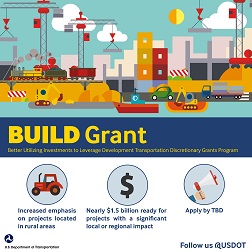Low and No-Emission Component Assessment Program (LoNo-CAP)
FY2016 Selections
In January 2017, FTA announced the selection of The Ohio State University and Auburn University to receive research funds under the Fiscal Year 2016 LoNo-CAP funding opportunity.
FY2016 Program Background
On September 29, 2016, FTA announced the opportunity for eligible institutions of higher education to apply for funding to conduct testing, evaluation, and analysis of low or no emission (LoNo) components intended for use in LoNo transit buses used to provide public transportation. The deadline for applications was November 28, 2016.
- The supplemental form was updated to allow printing
- See the LoNo-CAP application FAQs
Overview
Since 2014, FTA has provided over $100 million in competitive funds to support the introduction of low- and no-emission (LoNo) transit buses into transit system fleets. LoNo-CAP will directly support the mission of FTA’s ongoing Low-No programs by providing unbiased assessments of LoNo components used in transit buses, publishing the assessments online, and summarizing them in an annual report to Congress. LoNo component assessments will document -- at a minimum -- the maintainability, reliability, performance, structural integrity, efficiency, and noise of the tested components.
LoNo-CAP differs from the Bus Testing Program (Section 5318) in that LoNo-CAP testing is voluntary; it will only test components, and it will not assign passing or failing scores. The LoNo component testing performed under LoNo-CAP complements the Section 5318 Bus Testing Program, under which FTA will continue to test complete buses as a condition of eligibility for FTA grant funding.
For the purpose of LoNo-CAP, the term “low or no emission component” means an item that is separately installed in and removable from a low or no emission transit bus. The components to be tested under LoNo-CAP should enable or significantly support low or zero emissions transit bus operation.
Objectives
FTA’s goals for LoNo-CAP are to:
- Provide unbiased assessments of low- or no-emission vehicle components, documenting (at a minimum) the maintainability, reliability, performance, structural integrity, efficiency, and noise of the tested components
- Increase the quality and lower the overall cost of low- or no-emission vehicle components
- Expand the supply chain for low or no emission vehicle components
- Increase the deployment of the cleanest and most energy-efficient transit buses into transit agency fleets
- Advance the development of materials, technologies, and safer designs
- Support the development of applicable standards, protocols, and best practices
- Reduce the risk to Transit Vehicle Manufacturers of using low- or no-emission vehicle components from unfamiliar manufacturers
- Complement, not replace, the testing of complete transit buses performed under FTA's Bus Testing Program (Section 5318)
- Complement, not replace, existing federal government testing (e.g., Environmental Protection Agency testing of engine emissions, National Highway Traffic Safety Administration testing of crash safety, etc.)
- Continue FTA’s legacy of supporting the transit industry in the introduction of advanced technologies to reduce the energy consumption and emissions of transit buses
Eligible Activities
Eligible activities under LoNo-CAP include testing and assessing voluntarily submitted Low-No components for transit buses, publishing the results of these LoNo component assessments, and preparing an annual report to Congress summarizing the results of the component assessments.
Eligible Recipients
As specified in Section 5312(h), FTA will consider proposals only from “institutions of higher education” as defined in section 102 of the Higher Education Act of 1965 (20 U.S.C. 1002). Eligible institution(s) of higher education must have capacity to carry out transportation-related advanced component testing and evaluation, with laboratories capable of testing and evaluation, and direct access to or a partnership with a testing facility capable of emulating real-world circumstances in order to test low or no emission components. The facility operated and maintained under FTA's Bus Testing Program (Section 5318) is specifically excluded from eligibility for LoNo-CAP.
Once competitively selected, the selected institution(s) will not need to re-compete for the duration of the FAST Act authorization – through Fiscal Year 2020 (FY20).
Statutory References
49 U.S.C. 5312(h)
Allocation of Funding
$3 million in FY16. $3 million per year in FY17-FY20, subject to future appropriations, up to $15 million total.
Match
Traditional cost-sharing or matching is not required for awards resulting from this funding opportunity. Pursuant to Section 5312(h), FTA will pay 50 percent of the established testing fee of low- or no-emission transit bus components, up to a maximum of $3 million per year for each of FY2016 through FY2020. The remainder of the testing cost will be recovered from fees collected from the entities having the tests performed.
For questions or comments, please contact:
Samuel Yimer
Samuel.Yimer@dot.gov
202-366-1321

 U.S. DOT’s Better Utilizing Investments to Leverage Development (BUILD) Transportation Discretionary Grants program funds investments in transportation infrastructure, including transit. BUILD Transportation grants replace the Transportation Investment Generating Economic Recovery (TIGER) grant program. Learn more about
U.S. DOT’s Better Utilizing Investments to Leverage Development (BUILD) Transportation Discretionary Grants program funds investments in transportation infrastructure, including transit. BUILD Transportation grants replace the Transportation Investment Generating Economic Recovery (TIGER) grant program. Learn more about